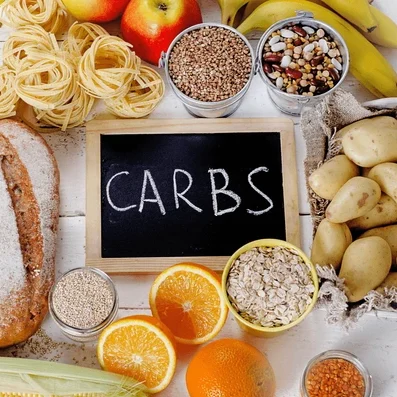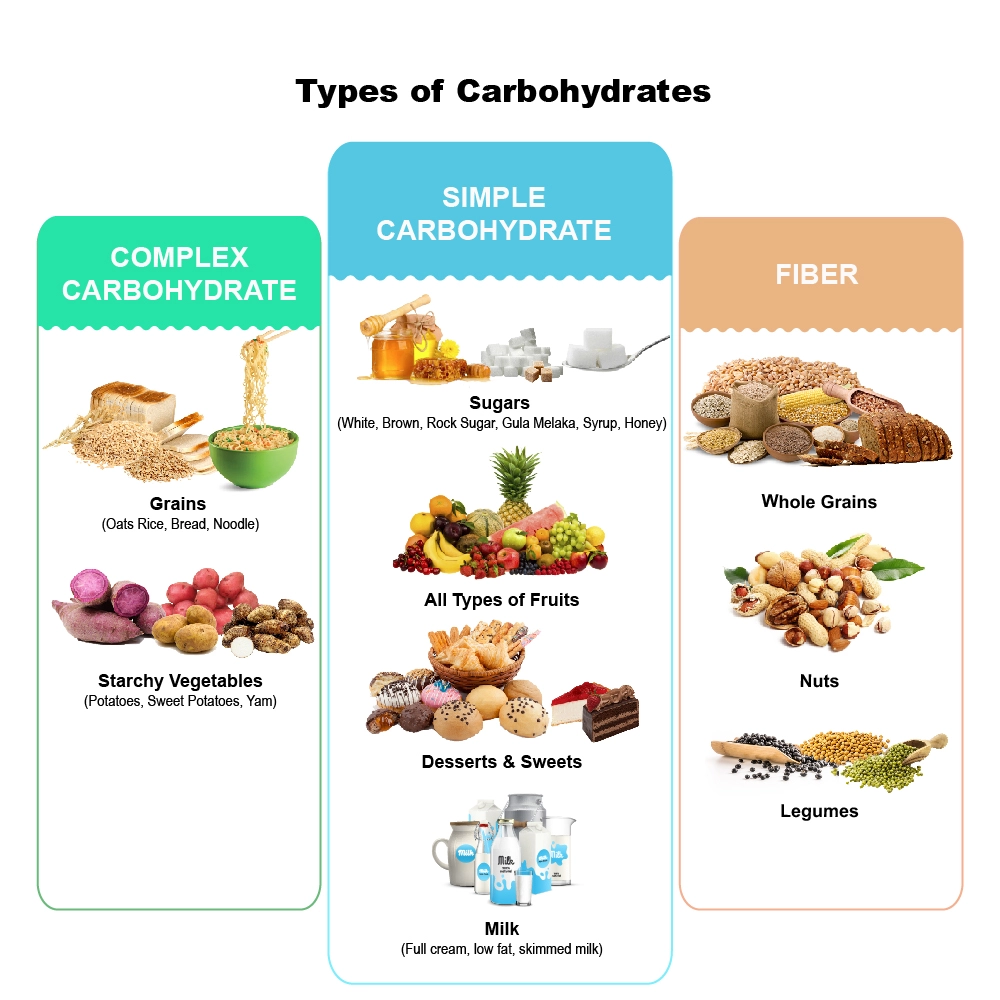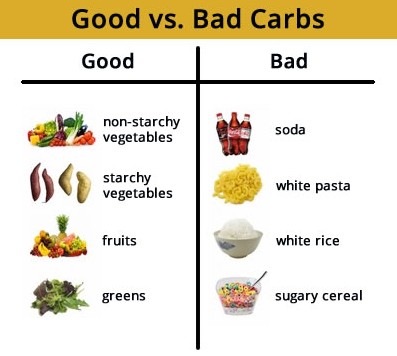
Carbohydrates are an essential part of our diet and play a significant role in our body’s daily functions. They are one of the three main macronutrients, alongside proteins and fats. Understanding carbohydrates, how they work, their types, and their importance can help you make better food choices and improve your overall health. This article will take you through everything you need to know about carbohydrates in simple words.
What Are Carbohydrates?
Carbohydrates, often referred to as “carbs,” are organic molecules composed of carbon, hydrogen, and oxygen. They are a primary source of energy for our bodies. When you eat carbohydrates, your body breaks them down into glucose, which is a type of sugar that serves as fuel for your cells and organs.

The Role of Carbohydrates in the Body
- Energy Production: Carbohydrates are the most efficient source of energy for your body. When you consume carbs, they are converted into glucose. This glucose can be used immediately for energy or stored in the liver and muscles for later use.
- Brain Function: The brain relies on glucose as its main energy source. Adequate carbohydrate intake is essential for maintaining focus, concentration, and overall brain function.
- Supporting Physical Activity: Carbohydrates provide the energy needed for physical activities. Whether you are exercising, working, or doing daily tasks, carbs help sustain your energy levels.
- Digestive Health: Some carbohydrates, especially those high in fiber, support digestive health. Fiber aids in regular bowel movements and prevents constipation.
- Storage for Future Use: Any excess glucose that your body doesn’t need right away is converted into glycogen and stored in your liver and muscles for future energy needs.
Types of Carbohydrates
Carbohydrates can be categorized into three main types: sugars, starches, and fiber. Understanding these types can help you choose healthier carb sources.
- Sugars: Sugars are simple carbohydrates. They are made up of single or double sugar molecules. Common examples include glucose, fructose (found in fruits), and sucrose (table sugar). Sugars are quickly absorbed by the body and provide immediate energy.
- Starches: Starches are complex carbohydrates made up of many sugar molecules linked together. They take longer to digest compared to sugars, leading to a more prolonged release of energy. Foods high in starch include bread, rice, pasta, and potatoes.
- Fiber: Fiber is also a complex carbohydrate, but it is not digestible by the body. It helps regulate your digestive system and can lower the risk of certain diseases. There are two types of dietary fiber: –Soluble Fiber: This type dissolves in water and can help lower blood sugar and cholesterol levels. Foods high in soluble fiber include oats, beans, and apples. –Insoluble Fiber: This type does not dissolve in water and helps move food through your digestive system. Foods rich in insoluble fiber include whole grains and vegetables.

Good Carbs vs. Bad Carbs
Not all carbohydrates are created equal. It’s important to distinguish between “good” carbs and “bad” carbs:
- Good Carbs: These are unprocessed or minimally processed carbohydrates that provide essential nutrients and fiber. Examples include whole grains (like brown rice and quinoa), legumes (like beans and lentils), fruits, and vegetables.
- Bad Carbs: These are highly processed carbohydrates that often contain added sugars and lack essential nutrients. Examples include sugary drinks, sweets, white bread, and many snack foods. Consuming these types of carbs can lead to spikes in blood sugar and contribute to weight gain and other health issues.
Fun Facts About Carbohydrates
Carbohydrates are often misunderstood, but they play a crucial role in our diet and overall health.
Here are some fun and informative facts about carbs: Did you know that carbohydrates are the body’s primary energy source? They can be categorized into two main types: simple and complex. Simple carbs, like sugars, provide quick energy, while complex carbs, such as whole grains, offer sustained energy and are rich in fiber.
Additionally, certain carbohydrates can boost your mood, as they help produce serotonin, a neurotransmitter that contributes to feelings of well-being.
Finally, not all carbs are created equal—choosing whole, unprocessed options can lead to better health outcomes compared to refined carbs.
Daily Recommended Carbohydrate Intake
The amount of carbohydrates a person needs can vary depending on several factors, including age, gender, activity level, and overall health. However, general guidelines suggest that carbohydrates should make up about 45% to 65% of your total daily calorie intake.
For example, if you consume a 2,000-calorie diet, this means you should aim for about 225 to 325 grams of carbohydrates per day. It’s essential to focus on high-quality carbohydrate sources to meet your nutrient needs.
Carbohydrates and Dietary Trends
In recent years, there have been many dietary trends that focus on reducing carbohydrate intake, such as low-carb diets (like the ketogenic diet) and paleo diet. While some people find success with these diets, it’s important to remember that a balanced diet should include carbs, particularly to fuel an active lifestyle.
If you are considering a low-carb diet, it’s crucial to consult a healthcare professional or nutritionist to ensure you are meeting your nutritional needs.
How to Incorporate Healthy Carbohydrates into Your Diet
Incorporating healthy carbohydrates into your diet can be simple and delicious. Here are some tips to help you include good carbs in your meals:
- Choose Whole Grains: Opt for whole-grain bread, brown rice, quinoa, and whole-grain pasta instead of white varieties.
- Eat Plenty of Fruits and Vegetables: Aim to fill half your plate with colorful fruits and vegetables at each meal. They are filled with vitamins, minerals, and fiber.
- Include Legumes: Beans, lentils, and peas are excellent carbohydrate sources packed with protein and fiber.
- Limit Sugary Foods: Reduce the intake of sugary snacks and drinks. Instead, opt for healthier alternatives like fresh fruit or yogurt.
- Read Labels: When shopping for packaged foods, read the nutrition labels. Look for products low in added sugars and high in fibers.

Conclusion
Carbohydrates are an essential part of a balanced diet. They provide energy for your body and support various vital functions, including brain health and physical activity. By focusing on whole, unprocessed carbohydrates, you can enjoy their benefits while maintaining a healthy lifestyle.
Understanding carbohydrates can enable you to make informed choices about your diet. Whether you are looking to maintain your health, boost your energy, or improve your fitness, making smart carbohydrate choices will help you achieve your goals. Remember, moderation is key, and making balanced choices will lead to a healthier you.

Leave a Reply